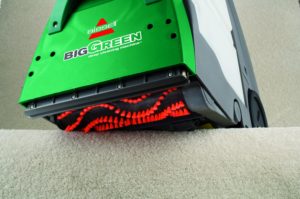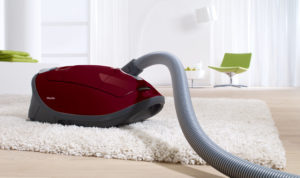
If you’re going to choose a carpet or area rug, statistically speaking, you’re going to choose one made from a synthetic fiber, and that fiber’s probably going to be nylon. But if you’ve got your heart set on a natural fiber, whether for environmental, aesthetic, or health reasons, you’re probably going to choose wool. And why not? It’s durable, warm, sound-isolating, and soft.
However, it’s also notorious for being next to impossible to safely clean, which is why many homeowners who’d otherwise choose wool end up returning to synthetic fibers like olefin as a compromise. But if you know what you’re doing, cleaning wool doesn’t have to be three steps away from witchcraft. If you don’t want to hire professional cleaners or shamans to help you maintain your wool carpet or rug, here’s how to safely cleaning it on your own with nothing more than a carpet cleaner and vacuum (and we’ll share our recommendations for those below). First we’ll cover some common myths and then address what to do for success.
Can you safely wet-clean wool carpeting without damaging, shrinking, or discoloring the fibers?
Most homeowners shy away from wet-cleaning wool out of a fear of damaging, shrinking, or browning its fibers. While it’s true that you can easily do any of these three things to wool if you don’t know what you’re doing, it’s also true that you can use a carpet cleaner like the Bissell 86T3 Big Green to safely clean wool carpets and rugs without harming them.
Wool is essentially sheep fur or hair, and you can clean hair with water whether it once grew on a human, a dog, a cat, or a sheep. The key is to use your wet extractor (i.e., your carpet cleaner) properly.
Similarly, you can wet-clean wool carpets without shrinking them as long as you make sure to use cool or lukewarm water instead of hot water. You also want to make sure you use as little cleaning solution as possible, as the high absorbency of wool can quickly lead to saturation, which can cause a range of other problems, including mold and mildew growth.
Finally, just as you can wet-clean wool without shrinking it, you can also clean it without turning the fibers brown or other colors. Carpet discoloration during wet cleaning typically comes from saturating the carpet down to the carpet backing; this can happen to any carpet, and it isn’t a feature unique to wool. This is one of many reasons why testing your cleaning procedure on a small patch of carpet is a good idea to make sure you aren’t using too much water or solution, and that the solution itself isn’t damaging to the fibers (e.g., a bleach-based cleaner).
Is air-drying the only way to safely dry wool carpets and rugs?
No. While air-drying is a safe way to dry wool carpets and rugs, it’s not the only way. The overall goal is to dry the wool as quickly as possible to reduce the risk of mold and mildew growth. Ventilation is your friend; open as many windows and doors as possible to allow cross-currents and activate every fixed and movable fan you can find to move air as efficiently as possible. You can also vacuum your carpets with a carpet cleaner (without using liquids, of course) to recover liquids and accelerate drying.
Can you ever use bleach to safely clean stains on wool carpeting?
While there are a lot of myths surrounding cleaning with wool, the idea that bleach will melt wool carpets is not one of them. You should never use bleach on wool; bleach is capable of dissolving wool, and any products that contain bleach should also be kept away from carpets with full or partial wool fiber content. To clean stains, you’ll want to follow the steps we outline below.
How do you clean wool with a carpet cleaner without damaging it?
To clean wool carpets and rugs with carpet cleaners and vacuums without damaging the fibers, you’ll always want to start by vacuuming the carpet or fiber first to remove any surface level dirt; we recommend doing so with a quality vacuum that lets you adjust height and power to match the specific needs of your wool carpet or rug.
Next, open all your windows and doors to provide as much ventilation as possible; keep them open as long as you’re cleaning or drying the carpeting. If you have fans, whether ceiling-mounted or portable, turn them on to full power and run them throughout the cleaning process.
Next, test your cleaning solution. Find an out of the way part of your carpet or rug and test it with your cleaning solution. This will help you make sure that whatever you’re about to use isn’t going to damage your carpet or change its colors forever.
Once you’ve vacuumed the carpet and confirmed your solution is safe to use, start using the carpet cleaner. Move slowly, check your work, and make sure you aren’t over-wetting or saturating the carpet; you only need to cover each section once while applying the solution. Use cold or lukewarm water, never hot.
After cleaning the carpet, focus on drying it as quickly as possible by following the already-mentioned steps above. Remember that you can use your carpet cleaner in a vacuum-only mode to help extract as much liquid as possible; the sooner your carpet dries, the better.
Which carpet cleaners and vacuums will safely clean wool carpets and rugs?

The truth is that you can use just about any carpet cleaner or vacuum to clean wool without damaging it; the key, as we’ve noted above, is knowing how to use the tools correctly. For carpet cleaners, we recommend the Bissell 86T3 Big Green. We’ve discussed its utility with wool here and reviewed and compared it elsewhere (e.g., here and here) and found it to be the best carpet cleaning investment on the market below $1,000.

For vacuuming, we’d recommend machines that allow you to extensively adjust cleaning heights and that come with a range of power settings to clean the fibers without damaging them. We’d also recommend machines compatible not only with wool carpets but with all other piles and styles in your home to avoid needing to own multiple sets of vacuums. In our books, the best do-it-all machines under $1,000 are the Miele Complete C3 Soft Carpet or the Miele Compact C2 Electro+. Both are capable of handling bare floors, residential and commercial carpet styles, and low-to high-pile carpeting.
![]() You can buy the Bissell 85T3 Big Green carpet cleaner here on Amazon. You can buy the Miele Complete C3 Soft Carpet here or buy the Miele Compact C2 Electro+ here.
You can buy the Bissell 85T3 Big Green carpet cleaner here on Amazon. You can buy the Miele Complete C3 Soft Carpet here or buy the Miele Compact C2 Electro+ here.
![]() Canadians can buy the Miele Soft Carpet here, the Compact Electro+ here, and the Bissell Big Green here.
Canadians can buy the Miele Soft Carpet here, the Compact Electro+ here, and the Bissell Big Green here.
 If you find our research on PMC helpful, you can follow our efforts to keep maniacally reviewing home cleaning tools by shopping through our links above. We promise to keep fighting the good fight against every horror children, animals, and grown, yet messy humans can inflict upon a clean home.
If you find our research on PMC helpful, you can follow our efforts to keep maniacally reviewing home cleaning tools by shopping through our links above. We promise to keep fighting the good fight against every horror children, animals, and grown, yet messy humans can inflict upon a clean home.

